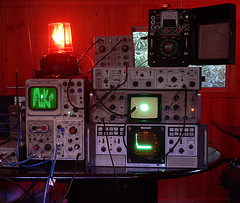
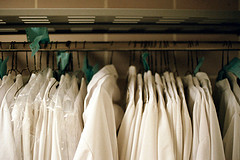
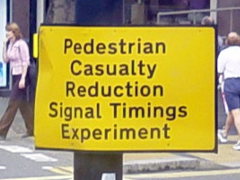

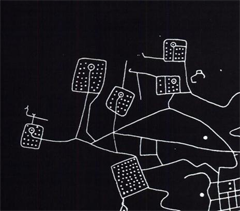
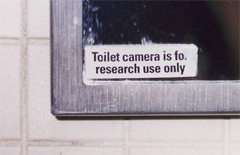
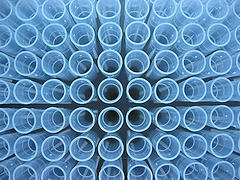
COMM 840.002 / SI 755.001 -- Fall 2013
Prof. Sandvig, University of Michigan
http://840.niftyc.org/
Announcements
- Seminar Papers are due Dec 16 at 1:30 p.m.
- Please post answers to your weekly questions to our class forum on CTools.
- This web site is the syllabus for the class "Unorthodox Research Methods" at the University of Michigan. Please refer to this Web page for the most up-to-date information about the course.
About the Class
Instructor
Prof. Christian Sandvig
csandvig@umich.edu
734/763-0861
http://www.niftyc.org/
Office: 5385 North Quad
My mailbox is in the Communication Studies 5th floor mailbox room (5334 North Quad)
Office Hours: 9:30-10:30 a.m. Tuesdays and by appointment
Course Description
Any traditional research method was once unorthodox. While many are prone to see methods as boring tools (or even as a necessary but unpleasant step on the road to results), any common method was once daring and controversial. This seminar will cover very recent developments in both qualitative and quantitative social scientific research methods and attempt to address the question of how new research methods are invented, applied, transferred between problems and disciplines, and formalized. The overall focus of the course will be research design, rather than learning the procedures of a single method. In addition, we will spend some time trying to think creatively about possible new methods and designs. Readings in the course will be split between classics and readings concerning very recent innovations in methods. In discussion of recent methodological trends, particular attention will be paid to Internet / new media research, new digital sources of data (sometimes called "big data" or "e-social science"), spatial / geographic methods, visualization as a research method, social justice activism, and unobtrusive methods. A goal of the seminar is to encourage researchers to conceptualize methodology -- whether using new or old methods -- as a creative act.
Course Credit
- This course is intended for doctoral students. Other graduate students may enroll by instructor permission if there is a good reason to do so.
- Students from other programs (not COMM or SI) are welcome with consent of instructor.
- Some familiarity with a research method from any research tradition is required; completing most methods courses in the past satisfy this requirement. Co-enrollment in a methods course (i.e. right now) also satisfies this requirement.
Class Requirements
Students will be responsible for a seminar paper proposal and a research paper of about 25 pages. In addition, there will be short weekly assignments or "questions" due at the beginning of each class meeting when reading is assigned. These will be read and discussed in class but not graded. All assignments will be turned in electronically. No late work! No incompletes!
The weekly questions will probably follow this pattern:
4 short responses to questions about methods
4 research designs
1 proposals for a new measure or statistic
2 ideas for new visualizations
1 curricular material about methods
Required Books
There are FOUR required books. Other readings will be distributed electronically. You can buy the required books anywhere you'd like. For example, if you buy them new from amazon.com they can be returned for a full refund within 30 days, and if you sign up for "Amazon Student" two-day shipping is free. All of these books are also widely available on the Web. They are available as discounted used books, as textbook rentals, and at the library.
A quick word about buying the books: As befits the topic of the class some of them are unorthodox. A librarian and fan of the Lesy book commented, "I can't believe this is an assigned reading for a course!" I know the Webb book is not cheap and the Lesy book is strange but I think you will find them worthwhile.
- Unobtrusive Measures
by Eugene J. Webb, Donald T. Campbell, Richard D. Schwartz, Lee Sechrest
Sage, 1999
(revised edition)
[buy from amazon.com] [buy from alibris] - Envisioning Information
by Edward Tufte
Graphics Press, 2005
[buy from amazon.com] [buy from alibris] (50+ used copies are available on alibris!) - Wisconsin Death Trip
by Michael Lesy
University of New Mexico Press, 2000
(new edition)
[buy from amazon.com] [buy from alibris] - Digital Methods
by Richard Rogers
MIT Press, 2013
(hardcover only)
[buy from amazon.com] (This book is not available used that I can find.)
Online Readings
Online readings are available in electronic form either free on the Web or using using password-protected links to PDFs. These password-protected links lead to the reading in CTools directly from this page. You do not need to use CTools. Just go to this page.
Recommended Books
These books are recommended in the sense that every doctoral student working in the social sciences should own them already. If you don't own them, you should buy them! They are highly recommended.
- Howard S. Becker & Pamela Richards. (2007). Writing for Social Scientists: How to Start and Finish Your Thesis, Book, or Article. Chicago: University of Chicago Press. (any edition is fine.)
- William Strunk, Jr. & E. B. White. (2000). The Elements of Style. New York: Longman. (Any edition is fine except for the 1920 or 2011 "Original Edition" that does not include E. B. White.)
Schedule
These dates and readings will be adjusted to reflect our progress (or lack of it). This means that you should check the class Web site regularly for updates.
Beware: Note that links on this page to slides and readings are often large PDF files.
Part I: An Overview of Orthodoxy and Research Methods
5 Sep (Th): Introduction
Please carefully read the syllabus.
12 Sep (Th): Methods, Instruments, and Orthodoxy
- E-mail your answer to the weekly question to the instructor before class begins.
- Popper, Karl. (1963) Conjectures and Refutations, London: Routledge and Keagan Paul. (read only pp. 33-39, Science as Falsification) (on CTools)
- Pajares, Frank. (n.d.) The Structure of Scientific Revolutions by Thomas S. Kuhn: A Synopsis. The Philosopher's Magazine. (on CTools)
- Bird, Alexander. (2004). Thomas Kuhn. Stanford Encyclopedia of Philosophy. Stanford, California: Metaphysics Research Laboratory. (Web reading: read the section "Kuhn and Social Science") http://plato.stanford.edu/entries/thomas-kuhn/#6.3
- de Solla Price, Derek J. (1986). Little Science, Big Science... and Beyond. New York: Columbia University Press. (read the chapter: "Of Sealing Wax and String") (on CTools)
- Feyerabend, Paul. (1975). Against Method: Outline of an Anarchistic Theory of Knowledge. Humanities Press. (on CTools)
- Ozaktas, Haldun M. (2005). The Optimal Number of Friends in the Information Age. Journal of Irreproducible Results 49(4): 32. [Skim only! This article was intended by the author as a joke!] (on CTools)
19 Sep (Th): Writing Method, Research as a Genre, More on Orthodoxy
- E-mail your answer to the weekly question to the instructor before class begins.
- Smith, John K. & Heshusius, Lous. (1986). Closing Down the Conversation: The End of the Quantitative-Qualitative Debate Among Educational Inquirers. Educational Researcher 15(1): 4-12. (on CTools)
- Swales, John M. (1990). Episodes in the History of the Research Article. From: John M. Swales, Genre Analysis: English in Academic and Research Settings. Cambridge: Cambridge University Press. (selected excerpts) (on CTools)
- Pencil, Murdock. (1976). Salt Passage Research: The State of the Art. Journal of Communication 26 (4): 31-36. (on CTools)
- Zongker, Doug. (2006). Chicken Chicken Chicken: Chicken Chicken. Annals of Improbable Research 12(5): 16-21. (on CTools)
- Optional: See also the conference presentation (YouTube) and the slides (.PPT) for this paper.
- McCloskey, D. N. (1985). From Methodology to Rhetoric. From: D. N. McCloskey, The Rhetoric of Economics. Madison: University of Wisconsin Press. (on CTools)
- Harding, Sandra. (1987). Is There a Feminist Method? From: S. Harding, Feminism and Methodology. Buckingham: Open University Press. (selected excerpts) (on CTools)
- Maynard, Mary (1994). Methods, Practice, and Epistemology: The Debate About Feminism and Research. From: M. Maynard & J. Purvis (eds.), Researching Women's Lives from a Feminist Perspective. London: Taylor and Francis. (selected excerpts) (on CTools)
- Roth, Julius A. (1966). Hired Hand Research. American Sociologist 1(4): 190-196. (on CTools)
26 Sep (Th): Quantification and Probability: The Life Cycle of a Method
(a.k.a.: How Exciting Methods Become Boring and Vice Versa)
- Post your answer to the weekly question to the CTools forum before class begins.
- Davis, Murray S. (1971). That's Interesting! Towards a Phenomenology of Sociology and a Sociology of Phenomenology. Philosophy of Social Science 1: 309-344. (on CTools)
- Hacking, Ian. (1990). The Taming of Chance. New York: Cambridge University Press. (Read Ch. 1, The Argument [pp. 1-7]). (on CTools) (This PDF is intentionally truncated.)
- Hacking, Ian. (1990). The Taming of Chance. New York: Cambridge University Press. (Read Outline of Other Chapters). (on CTools)
- McCloskey, Donald N. (1986). Why Economic Historians Should Stop Relying on Statistical Tests of Significance, and Lead Economists and Historians Into the Promised Land. Newsletter of the Cliometrics Society 2(2). http://www.deirdremccloskey.org/docs/pdf/Article_180.pdf
- Jackman, Simon. (2009). Bayesian Analysis for the Social Sciences. Wiley-Blackwell: New York. (Excerpts.) (on CTools)
- Forscher, Bernard K. (1963). Chaos in the Brickyard. Science 142(3590): 339. (on CTools)
- Optional:
- LaLoudouanna, Doudou & Tarare, Mambobo B. (2003). Data Set Selection. Journal of Machine Learning Gossip 1: 11-19 http://citeseerx.ist.psu.edu/viewdoc/download;jsessionid=41081C5E8486C751A2B1402EF9A9AE0B?doi=10.1.1.59.8077&rep=rep1&type=pdf
(Note that this paper is not real, sort of.) - Sterne, Jonathan A. C. & Smith, George Davey. (2001). Sifting the Evidence: What's Wrong with Significance Tests? British Medical Journal 322: 226-231. http://www.ncbi.nlm.nih.gov/pmc/articles/PMC1119478/pdf/226.pdf (assumes some familiarity with statistical methods.)
- Ioannidis, John P. A. (2005). Why Most Published Research Findings Are False. PLoS Medicine 2(8): 696-701. http://www.plosmedicine.org/article/fetchObjectAttachment.action?uri=inf... (assumes more familiarity with statistical methods.)
- LaLoudouanna, Doudou & Tarare, Mambobo B. (2003). Data Set Selection. Journal of Machine Learning Gossip 1: 11-19 http://citeseerx.ist.psu.edu/viewdoc/download;jsessionid=41081C5E8486C751A2B1402EF9A9AE0B?doi=10.1.1.59.8077&rep=rep1&type=pdf
Part II: Case Studies of Unorthodox Research Methods
3 Oct (Th): Archives and Visual Argument
(includes: The Case of Michael Lesy)
- Post your answer to the weekly question to the CTools forum before class begins.
- Read Wisconsin Death Trip. (all of it).
- Please browse The Charles Van Schaick Archive of the Wisconsin Historical Society: http://www.flickr.com/photos/whsimages/sets/72157602476458793/
- Optional / also discussed in class:
- An Interview with Michael Lesy -- http://www.identitytheory.com/michael-lesy/
- Berger, John & Mohr, Jean. (1997). A Fortunate Man: The Story of a Country Doctor. New York: Vintage.
- Berger, John & Mohr, Jean. (2010). A Seventh Man: A Book of Images and Words about the Experience of Migrant Workers in Europe (new ed.) New York: Verso.
10 Oct (Th): Unobtrusive Methods (I)
- Post your answer to the weekly question to the CTools forum before class begins.
- Read Webb et al. book Ch. 1-5 (Approximations to Knowledge, Physical Traces: Erosion and Accretion, Archives I: The Running Record, Archives II: The Episodic and Private Record, and Simple Observation).
- Skim the editorial information for the Journal of Universal Rejection.
17 Oct (Th): Unobtrusive Methods (II)
- Post your answer to the weekly question to the CTools forum before class begins.
- Read Webb et al. book Ch. 6-9 (Contrived Observation, A Final Note, A Statistician on Method, and Cardinal Newman's Epitaph.)
- Humphreys, Laud. (1970). Tearoom trade: a study of homosexual encounters in public places. New York: Duckworth. (read excerpts: Ch. 2, Hoffman, Glazer, and Retrospect.)
- Skim/play with: Trevor Paglen's Unmarked Planes and Hidden Geographies
24 Oct (Th): Social Justice, Activism and Method
(includes: The Case of Eric Michaels)
- Post your answer to the weekly question to the CTools forum before class begins.
- Michaels, Eric. & Warlpiri Media Association. (1985). The Aboriginal Invention of TV. Video recording. PAW Media: Yuendumu, Australia. (~13 mins.)
- Michaels, Eric. (1994). Bad Aboriginal Art: Tradition, Media, and Technological Horizons. Minneapolis: Minnesota University Press. (excerpts:)
- Langton, M. "Introduction" (1994)
- Hebdige, D. "Foreward" (excerpts: pp. ii-xxi, xxiii-xxv) (1994)
- Michaels, E. "For a Cultural Future: Francis Jupurrurla Makes TV at Yuendumu" (1986)
- Michaels, Eric. (1990). Unbecoming. Durham: Duke University Press. (various excerpts as marked) (Note that this is Michaels's AIDS diary.)
- Rowse, T. (1990). Enlisting the Warlpiri. Continuum: The Australian Journal of Media & Culture 3(2).
- Hodge, R. (1990). Aboriginal Truth and White Media: Eric Michaels meets the Spirit of Aboriginalism. Continuum: The Australian Journal of Media & Culture 3(2).
- Hinkson, M. (2002). New Media Projects at Yuendumu: Inter-cultural engagement and self-determination in an era of accelerated globalization. Continuum: Journal of Media & Cultural Studies 16(2): 201-220.
- Optional / also discussed in class:
- Michaels, Eric. (1982). TV Tribes. Unpublished Doctoral Dissertation. University of Texas, Austin. Austin, TX.
- Deger, Jennifer. (2006). Shimmering Screens: Making Media in an Aboriginal Community. Minneapolis: University of Minnesota Press.
- Srinivasan, R. (2012). Rethinking Digital Cultures and Divides: The Case for Reflective Media. The Information Society 28: 24-36.
31 Oct (Th): Visualization as Method
- Post your answer to the weekly question to the CTools forum before class begins.
- Tufte book (all of it.)
- Kosara, Robert. (2008). Visualization Criticism - The Missing Link Between Information Visualization and Art. IEEE Computer Graphics & Applications (CG&A), Visualization Viewpoints, vol. 28, no. 3, pp. 13-15. http://kosara.net/papers/Kosara_IV_2007.pdf
- Wattenberg, Marc. (n.d.) Arc Diagrams: Visualizing Structure in Strings
http://hint.fm/papers/arc-diagrams.pdf (just skim this.) - Jason Salavon, Every Playboy Centerfold
http://salavon.com/PlayboyDecades/PlayboyDecades.shtml - Golan Levin's The Dumpster
http://artport.whitney.org/commissions/thedumpster/ (play with.) - We Feel Fine by Jonathan Harris and Sep Kamvar
http://www.wefeelfine.org/ (play with.) - Peoplemovin by Carlo Zapponi
http://www.peoplemov.in/ (play with.) - Christian Behrens Information Design Patterns, v. 2.0
http://www.niceone.org/infodesignpatterns/index.php5#/patterns.php5 (click "patterns" and skim them) - Also discussed in class:
- the blog Beautiful Data (recommended)
- Georgi Grechko's cyclogram of the Salyut-6.
- Minard's portrait of Napoleon's March
7 Nov (Th): Internet Research / Digital Methods
- Post your answer to the weekly question to the CTools forum before class begins.
- Rogers book (all of it.)
- Rieder, Bernhard, and Theo Rhöle. "Digital Methods: Five Challenges." In David M. Berry, Understanding Digital Humanities, 67-84. Palgrave Macmillan, 2012. https://sites.google.com/site/dmberry/home/pdf-papers/tct2010_submission_14.pdf?attredirects=0&d=1
- Drucker, Johanna. "Humanities Approaches to Graphical Display." Digital Humanities Quarterly 5, no. 1 (2011). http://www.digitalhumanities.org/dhq/vol/5/1/000091/000091.html
- Optional:
- boyd, danah, and Kate Crawford. "Six Provocations for Big Data." Oxford Internet Institute, 2011. http://papers.ssrn.com/sol3/papers.cfm?abstract_id=1926431.
14 Nov (Th): Digital Humanities
Special Guest Star: Dr. Jean-Christophe Plantin
- Post your answer to the weekly question to the CTools forum before class begins.
- Kirschenbaum, Matthew. "What is digital humanities and what's it doing in english department", ADH Bulletin, 2010, pp. 1-7: http://mkirschenbaum.files.wordpress.com/2011/01/kirschenbaum_ade150.pdf
- "This Is Why We Fight": Defining the Values of the Digital Humanities" Lisa Spiro, in Gold, Matthew K., ed. Debates in the Digital Humanities, 2012, University of Minnesota Press: http://dhdebates.gc.cuny.edu/debates/text/13
- Hermeneutics of screwing around; or what to do with one million books, Stephen Ramsay, 2010, p. 1-9: http://www.playingwithhistory.com/wp-content/uploads/2010/04/hermeneutics.pdf
- Developing Things: Notes toward an Epistemology of Building in the Digital Humanities: Stephen Ramsay, Geoffrey Rockwell, in Gold, Matthew K., ed. Debates in the Digital Humanities. 2012, University of Minnesota Press: http://dhdebates.gc.cuny.edu/debates/text/11
- Manovich, Lev. "Computational Humanities Vs. Digital Humanities," March 16, 2012: http://lab.softwarestudies.com/2012/03/computational-humanities-vs-digital.html
- Browse / skim:
- "Mapping the Republic of Letters" : http://republicofletters.stanford.edu/casestudies/index.html
- Software study initiative: http://lab.softwarestudies.com/p/research_14.html
- Skim / glance at:
- Burdick, Anne, Johanna Drucker, Peter Lunenfeld, Todd Presner, and Jeffrey Schnapp. "Emerging methods and genres", in Digital_Humanities. The MIT Press, 2012, pp. 27-60. URL: http://mitpress.mit.edu/sites/default/files/titles/content/9780262018470_Open_Access_Edition.pdf
21 Nov (Th): Cartography and Geospatial Analysis
- Post your answer to the weekly question to the CTools forum before class begins.
- Monmonier, Mark. (1996). How to Lie With Maps (2nd. ed.) Chicago: University of Chicago Press. (Read pp. 1-23 and pp. 139-162)
- de Smith, Michael; Goodchild, Michael F.; & Longley, Paul A. (2008). Geospatial Analysis: A Comprehensive Guide to Principles, Techniques, and Software Tools. (2nd ed.) Leicester: Matador Press. (various excerpts.)
- Borges, Jorge Luis & Casares, Adolfo Bioy. (1946/1975). On Exactitude in Science. In: J. L. Borges, A Universal History of Infamy. (Norman Thomas de Giovanni, tr.) London: Penguin.
- Dodge, M. (2005). "The Role of Maps in Virtual Research Methods." In Virtual Methods: Issues in Social Research on the Internet, pp. 113-128. C. Hine (ed.). Oxford, UK: Berg Publishers. http://personalpages.manchester.ac.uk/staff/m.dodge/cv_files/virtual_methods_chapter.pdf
- Please look at:
- Strange Maps -- http://bigthink.com/blogs/strange-maps (this is easier to browse randomly than chronologically, please click around through past posts and be sure you skim a handful)
- Denis Wood and The Narrative Atlas of Boylan Heights (note the famed Jack-o-Lantern Map [scroll down to see it]).
- Also discussed in class:
- Schrage and Staple of TeleGeography and the Circadian geography of communications networks (no online version available that I can find).
- Roland Vilett and over-time "satellite" maps of GZ City (a virtual world)
- The Tactical Technology Collective: Information Activism -- https://informationactivism.org/en
- The Los Angeles Water Cycle by Jane Tsong
- An Atlas of Radical Cartography by Lize Mogel and Alexis Bhagat -- http://www.an-atlas.com/
- The Institute for Applied Autonomy: The iSee Project
- W20JW Radio Activity by Decade by Danny Gregory and Paul Sahre
28 Nov (Th): Thanksgiving Break
(NO CLASS)
5 Dec (Th): Teaching Research Methods; Conclusion
- In deference to your seminar paper, no substantial readings are due today. However, please read the short excerpt linked below and answer the weekly question.
- Eison, J. (2002). Teaching Strategies for the Twenty-First Century. In: R. M. Diamond (ed.), Field Guide to Academic Leadership. San Francisco: Jossey-Bass. (read this excerpt)
- Optional but recommended:
- subscribe to Tomorrow's Professor if you have not already done so and you are interested in teaching in the future.
- The Tomorrow's Professor Archive is also interesting to browse.
16 Dec (M): Final paper due at 1:30 p.m.
(This is the scheduled final exam period for this course according to the registrar's office.)
(tl;dr)